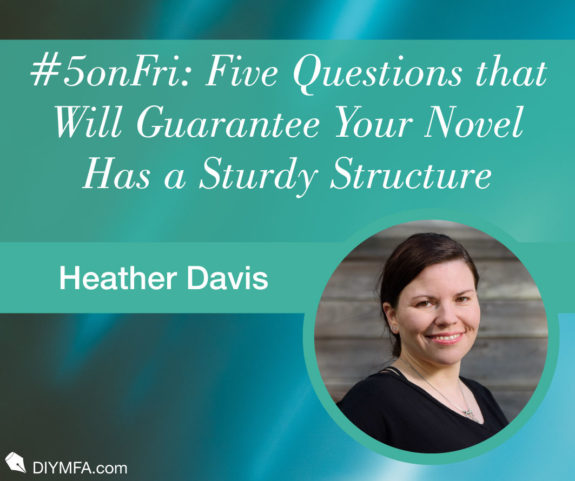A great novel is like a well-made house: it needs a sturdy structure, or it will eventually collapse. Unfortunately, that structure doesn’t just happen all on its own through some sort of divine story magic (boy, wouldn’t that be convenient). Instead, structure must be developed and applied with great care. Some authors create this structure before they put the first word on the first page, while others prefer to write the first draft of their novel and then go back and apply the structure.
Personally, I am a huge advocate of applying at least some level of structure before you begin your first draft because it makes the process of writing and revising so much easier. In fact, a well-developed story structure applied right at the beginning of the writing process will save you months or years of pointless frustration and dead ends.
Although there are arguably many steps in developing a truly robust story structure, I have distilled down the five most important questions that you can ask yourself to make your novel’s structure much stronger and more resilient.
I will use The Hunger Games for my examples because most people have either read the book or seen the movie.
1. What Is the Point of Your Novel?
Every great novel ever written has a Point. It has something big it’s trying to say about the world or the human experience. And even though authors never beat their readers over the head with the point of their novel, it’s there, subtly peeking through in every scene, making the reader understand that the story is worth reading and talking about.
The Point usually sounds super cliche, and that’s absolutely fine. Why? Because that means it’s probably universal and maybe (if you’re lucky) even a touch profound.
The Point of the novel The Hunger Games is “You can and should fight back against an unjust system.”
If you don’t already know Point you’re trying to make with your novel, take some time to figure it out. Ask yourself what you want readers to walk away understanding about the world or themselves after they finish your novel. This might just be the most important information to know about your story because it is the yardstick by which you measure every other element you put into the novel.
In essence, every scene you write becomes an argument for the Point you’re trying to make, so you must have a crystal-clear understanding of what that Point is before you start writing.
2. What Is Your Story Question (Major Dramatic Question)?
Successful novels must have an implicit but central Story Question (also called a Major Dramatic Question). This is the big question that readers are flying through pages to uncover the answer to. This question is often focused on something external and intricately related to the main plot.
The Story Question in The Hunger Games is “Will Katniss survive the Hunger Games so she can continue to provide for her family?”
Notice how without this Story Question, the audience would not know how to measure the events of the narrative? The Story Question alerts the audience what to keep track of and what matters.
3. What Does Your Protagonist Want, and How Do They Change by the End of the Novel?
Everybody wants something, and your protagonist is no exception. And whatever they want must be big enough and visceral enough to drive the story forward and make the reader understand why they would go to such great lengths to get it.
At the same time, your protagonist is going to grow and change and learn the Point of the novel along the way. And at the end, they should be 180 degrees from where they started. Voila! They have transformed into a new (hopefully better) version of themselves.
In The Hunger Games, Katniss wants to survive because she is determined to provide for her family and keep them safe. In the beginning, this is the only thing driving her. However, during her time in the arena, she learns that survival isn’t the only thing that matters. She grows to trust Peeta, and she is willing to risk her life to stand against the system so they can both be victors.
4. What Is Your Ticking Clock?
A Ticking Clock is a very concrete, time-bound event or consequence that your protagonist is trying desperately to manage. The major Ticking Clock of the novel is often related to the Story Question and is usually framed something like this: If the protagonist doesn’t do X by a certain time, Y will happen.
And make no mistake, every story needs a Ticking Clock or there is no suspense and no tension. After all, why would there be? If nothing is shoving your protagonist along their path, they could decide to address their problems next year. Or, you know, the year after that.
In The Hunger Games, the Ticking Clock is the game itself. Once Katniss is in the arena, there’s no putting off trying to survive. Nope, she must do everything in her power to gain an advantage before one of the other 23 tributes kills her.
5. What Is Your Inciting Incident, Your Midpoint, and Your Finale?
The three of the most important, journey-defining moments of your novel are the Inciting Incident, the Midpoint, and the Finale, and you need to have a clear idea of what each will be as early in the drafting process as possible because they are the pillars of the novel.
The Inciting Incident is an event that happens to your protagonist early in the novel that catapults them out of their status quo, “normal” world and into an “upside-down” version of their world. This event has to be big enough and urgent enough that they can’t just decide to ignore it (because if they can, they will). It must utterly upend their life.
In The Hunger Games, the Inciting Incident is the moment Katniss’s little sister Prim is chosen as tribute and Katniss volunteers to take her place in the Hunger Games.
The Midpoint is the story-defining dramatic event, twist, or reversal that happens right in the middle of the novel that ensures the suspense and tension do not lag mid-book. It often takes the form of a false victory or false defeat. And it’s during this scene that the protagonist takes a moment to look inside themselves and begin to realize that they’re on the wrong path. They start to shift away from their superficial Want and to a deeper need (which, of course, moves them closer to understanding the Point of the novel).
In The Hunger Games, the Midpoint is that moment when Katniss realizes that Peeta is not really working with the career tributes and that he saved her life. She begins to realize that simply surviving is not enough.
The Finale is the most high-stakes, tense, riveting moment of your novel. This moment answers the Story Question, and is that juicy, nail-biting moment when your protagonist either achieves their goal or fails to achieve it.
In The Hunger Games, the Finale of the story is when Katniss and Peeta win the Hunger Games together, but the Capitol tries to change the rules, and, once again, pit them against each other. But Katniss is through being a victim now (because she has learned the Point of the novel) and decides to stand against the system. She and Peeta decide to kill themselves by eating poisonous berries rather than kill each other. And with this very dangerous gamble, Katniss outwits the game makers and forces them to renege. Both Katniss and Peeta are allowed to win.
Final Thoughts
Remember, writing a novel is a marvelous and creative venture, but it’s also one of the hardest projects you will ever take on. And it’s always best to set yourself up for success right from the beginning by making sure your novel has a sturdy structure and a satisfying arc of change for your protagonist.

Dr. Heather Davis is a storyteller, Author Accelerator certified book coach, certified copy editor, author platform expert, and the founder of The Kreative Authorpreneur. She helps aspiring diversity authors create emotionally complex novels that readers rave about and agents request.
Heather has studied under story experts Lisa Cron and Jennie Nash. She is a frequent contributor to Jane Friedman’s popular writing blog and has been featured on podcasts such as Editing Writing and Turning Readers into Writers. In the fall of 2022, Heather is slated as guest speaker inside the wildly popular Women In Publishing (WIP) School.
Heather lives on the Eastern Shore of Maryland where she loves trail running, sipping iced mocha lattes, and binging Audiobooks like some people binge Netflix. She is currently entangled in the process of editing her first speculative fiction novel (with the expert help of her own phenomenal book coach, of course). To find out if your novel is structurally sound and reader-friendly, take this quick QUIZ.
You can find her on her website or follow her on Twitter, Facebook, and Instagram.







